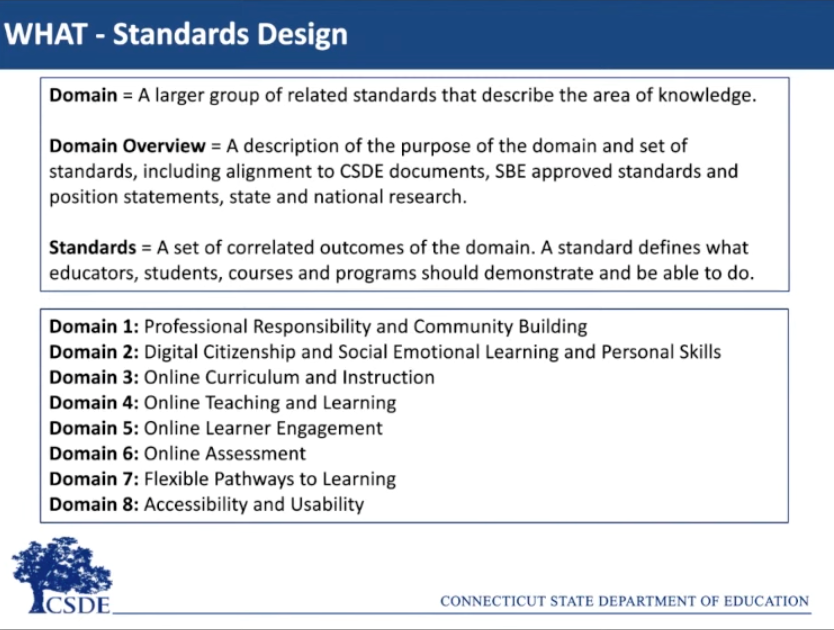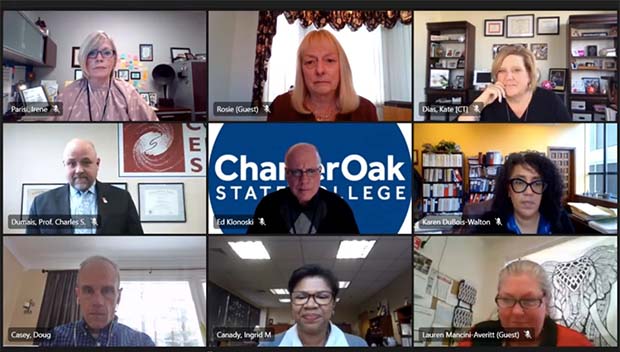While Connecticut public schools are currently prohibited from remote teaching and learning in most circumstances that will change come July. Last year legislators passed a law allowing high schools to offer remote learning to students starting July 1, 2022, if they so choose, and a state task force is currently charged with developing standards for remote learning as well as reviewing the feasibility of creating a K-12 statewide remote learning school.
At its meeting yesterday the Connecticut Remote Learning Commission took a look at eight domains and their associated standards drafted by the State Department of Education. The department said the draft was informed by focus groups of educators and in consultation with students, and borrowed heavily from national standards.
CEA President Kate Dias, who serves on the commission, pointed out the importance of considering which standards are necessary for a single remote course offering versus a fully remote program. “Really, those two need different perspectives,” she said. “We need to differentiate those two experiences because they need different expectations.”
Commission members saw many positives to the remote learning standards but also expressed concern about the level of resources available at the district level to create a learning environment in line with the standards. Suggestions for improvement included the need to add more about expectations for students, SEL, diversity, equity, and inclusion.
 “These are the ‘what,'” said Connecticut Commission for Educational Technology Executive Director Doug Casey. “The ‘how’—implementing these standards—will be a tall order.”
“These are the ‘what,'” said Connecticut Commission for Educational Technology Executive Director Doug Casey. “The ‘how’—implementing these standards—will be a tall order.”
Commissioner of Education Charlene Russell-Tucker pointed out that, with some districts looking to roll out remote learning for high schoolers in the next academic year and towns reviewing their budgets now, the commission has a tight timeframe for assessing and adopting the standards.
“I know a very few districts that want to provide a fully remote program next year, and they are definitely looking to outside sources,” said Connecticut Association of Public School Superintendents Executive Director Fran Rabinowitz. “It’s important to know how outside providers will be held to these standards as well.”
“We need to think these consequences all the way through,” said Dias.
Statewide remote school for Connecticut?
Whether it’s a single class or a statewide remote-only school, Dias said that equitable access has to be a top priority.
“We have to ensure that the opportunities to access remote instruction are equitable,” she said. “This can’t be another educational program provided only to those who can afford it. In the end, if the commission feels this is a viable option, all students should have reasonable and meaningful access.”
At previous meetings commission members have learned about statewide remote schools operating in other states including Florida, Virginia, and Massachusetts as they consider the feasibility of opening such a school in Connecticut. Presentations by officials from these other schools have raised concerns for the commission.
“The financial feasibility of such a school is worrisome,” said Dias, mentioning that the Massachusetts school is not accredited and requires a $10 million curriculum buy.
“If we’re talking about every district giving up $2 million so that we can have a remote program serving 1,000 kids across the state of Connecticut, I’m not really sure that’s feasible,” she added. “I think it’s reckless of us to put together a school that’s going to hit school budgets that are already stressed.”
A report on the Massachusetts school stated that it enrolled 2,514 students last school year, and from 2017-2020 the school had attendance rates below the state average.
“There does not appear to be an educational advantage or outcome here that would be a good use of time or money,” said Connecticut Association of Boards of Education and Essex Board of Education member Lon Seidman. “I just don’t know if a full-time school learning from home is going to be something that would help solve the problems we have.”
The commission is charged with submitting a report of its findings regarding a statewide remote school by July 1, 2022, and the State Department of Education has until July 1, 2023 to submit a plan on how to implement the school.
The Commission’s next meeting is scheduled for Monday, February 14 at 1 p.m.







